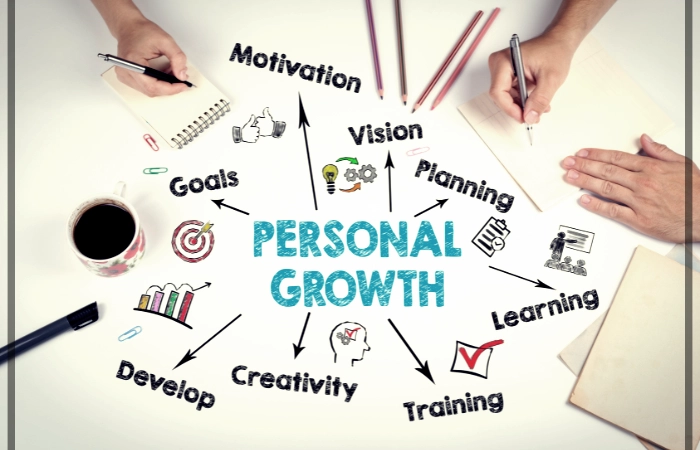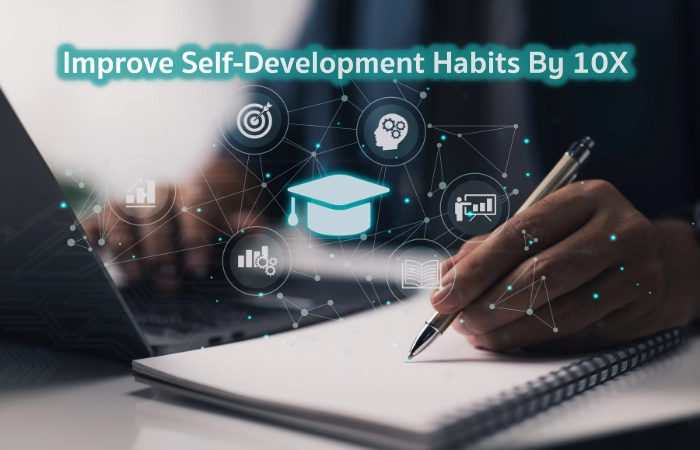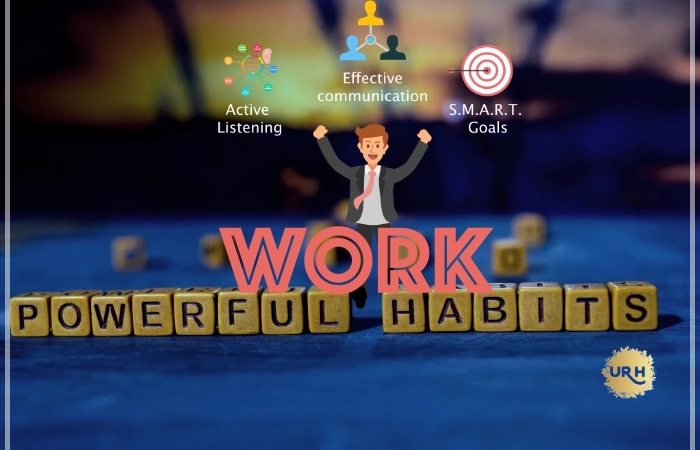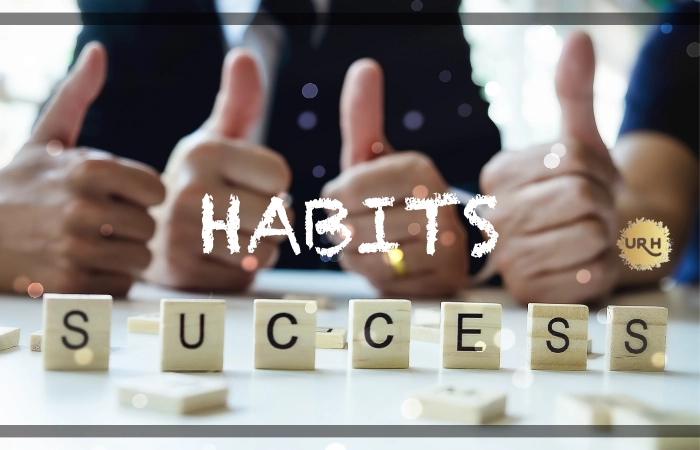10 Key Strategies for Personal Growth
The key to achieving your goals is having the right strategies for personal growth, even before you get started to work on achieving those goals.
So, if you are someone how want to know what are some good strategies for personal growth, I have listed 10 key strategies for personal growth for you that really work.
The first step towards your self-development and success is setting your personal growth goals, but what about rarely achieving them on time?
Do you face roadblocks/challenges (self-doubt, no Confidence) that prevent you from growing into the person you want to be? Then these strategies will help you.
10 Key Strategies for Personal Growth And Development
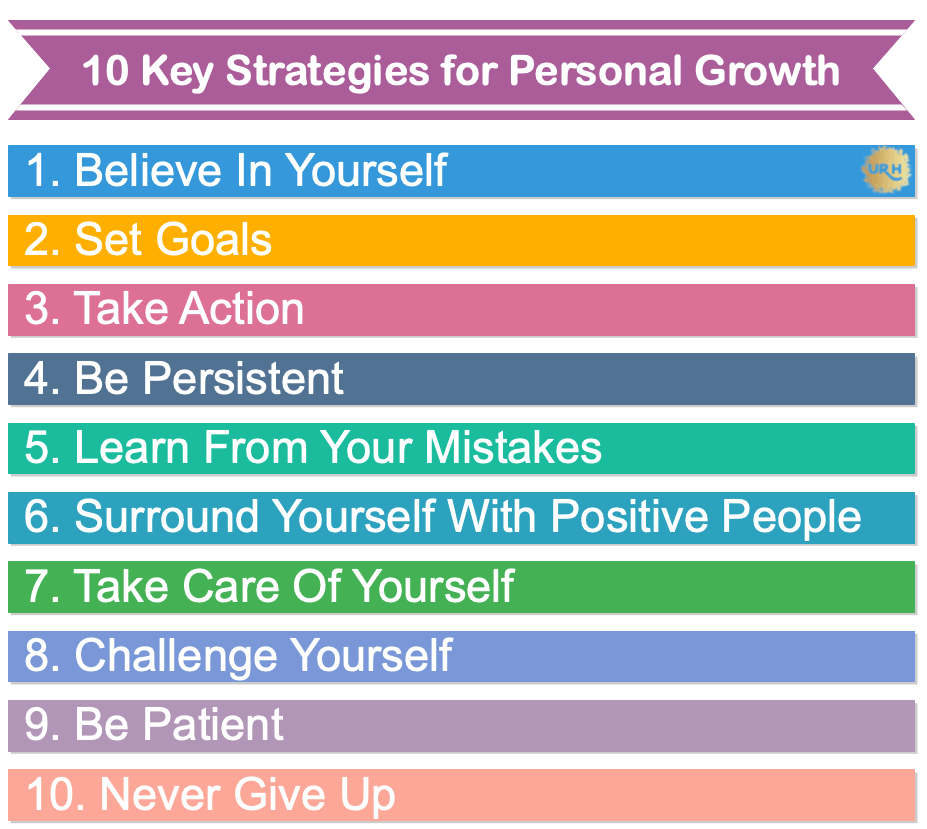
1. Believe In Yourself
Belief in yourself is the foundation of personal growth strategies, if you don’t believe in yourself then how else will?
Cultivate self-confidence and a positive mindset. Recognise your strengths and trust in your abilities/skills.
When you have unwavering faith in your abilities and potential, several motivating factors come into play:

Confidence
You feel confident when you believe in yourself, that you are capable of overcoming obstacles, with your experience, knowledge, and skills that you have.
Resilience
Believing in yourself strengthens your resilience, view failures as temporary setbacks and learning opportunities, rather than reasons to give up.
Positive Mindset
Self belief nurtures a positive mindset, you truly believe in yourself, and you cultivate a positive outlook on your abilities.
2. Set Goals
Determine what you want to accomplish and by when then break your aspirations into smaller goals. By having a roadmap (month-wise plan), you can track your progress and stay motivated.
SMART goals are a framework used to set specific, measurable, achievable, relevant, and time-bound objectives.
Let me help you with break down each element of a SMART goal with an example for each
S – Specific:
There should be no ambiguity in your goals; they should be distinct and obvious. Specify what you intend to achieve in detail.
An example of a specific goal would be to “Write and publish one blog post every week for the next three months” as opposed to a general one like “Improve my writing skills.”
M – Measurable:
Your goals should be quantifiable so that you are able to track the progress and help you determine when you will be able to achieve them (In time, before time).
Example: I will walk everyday, Instead of you can have measurable goal like I will walk 10K steps everyday.
A – Achievable:
Your goals should be clear and realistic, also they should be attainable within your capabilities and resources you have.
Example: Instead of setting an unrealistic goal like “Learn five new languages in a month,” an achievable goal would be “Complete an online language course and have basic conversational skills in Spanish within six months.”
R – Relevant:
You can have a goals that should align with your broader objectives and have significance in your personal or professional life.
Example: Instead of setting an irrelevant goal like “Learn to play a musical instrument” when your true passion lies in painting, a relevant goal would be “Attend painting classes twice a week and complete three original artworks within the next three months.”
T – Time-bound:
Your goals should have a specific timeframe or deadline to create a sense of urgency and provide a timeline for achievement.
Example: Instead of setting an open-ended goal like “Start a business someday,” a time-bound goal would be “Launch my online business and have the first ten sales within six months.”
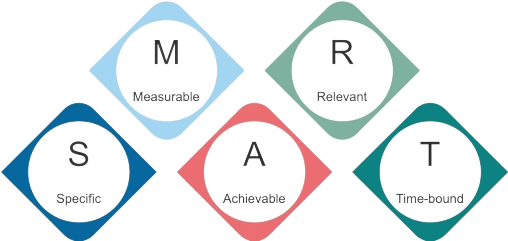
3. Take action
There is nothing called the perfect moment; take action now. Take the opportunities, challenge yourself, and be proactive in pursuing/following your goals.
Taking action is a vital step towards achieving your goals, follow your action plan (month-wise plan)
Clear Goals:
Start by setting clear and specific goals. Define what you want to accomplish, and break them down into actionable steps (to-do list, weekly plan). Once you have the goals, set priorities for them
Break It Down
Sometimes, big goals can feel overwhelming. Break them down into smaller, manageable tasks (To-do list).
This to-do list helps you to focus on one step at a time, as looking at the list you know which task is completed and which one is next.
Create A Plan
Develop a plan of action that have the steps needed to achieve your goals, like things you need to do, sequence of task and time required.
By using PDP this tool individuals can enhance their personal and professional growth. Determine the resources, timeframes, and milestones required to track progress.
Take The First Step
Taking the first step is always difficult. Overcome inertia and resistance by simply starting.
4. Be Persistent
Being persistent is a crucial attribute that can greatly benefit you on your journey to personal growth strategy and achieving your goals.
As you will not give up when you don’t see immediate results like it’s raining outside but you still continue doing your daily walk.
Continuing to try to do something even though it is difficult or other people may not understand why your doing it and want you to stop.
Achieving Long-Term Goals
Many excellent objectives must be attained over time with consistent effort. Even when the going becomes tough or the path isn’t clear.
You need to be persistence and that helps you stay focused on your objectives, you go on ticking weekly/monthly goals and finally you will get the ultimate goal achieved.
Developing Expertise
Mastery and expertise in any field or skill require consistent effort over a period of time. Persistence allows you to invest the time and practice required to develop and refine your skills, if you are working on the public speaking skill you need to practice regularly.
5. Learn From Your Mistakes
Without worrying about the result when you keep doing things, sometimes you will not get the desired outcome, so mistakes are an inevitable part of personal growth.
Ultimately you will find what is working for you, like practicing in a group, working at a particular time.
Learning From Failures
View failures as valuable learning opportunities, these challenges/issues you will never get in any books.
Instead of becoming discouraged or giving up after experiencing setbacks, persistence pushes you to analyse what went wrong, and what are my options, maybe that particular task just needs more time and it can be done.
Opening Doors To Opportunities
Learning from failures often leads to opportunities that may not have been immediately apparent.
By consistently learning on the go and demonstrating your dedication, you increase the likelihood of being noticed by seniors/others who can offer support, mentorship, or collaboration.
6. Surround Yourself With Positive People
Your environment plays a crucial role in shaping your mindset and beliefs, as you are constantly interacting with people around you and these daily interactions have an influence on yourself.
People with a growth mindset will always talk about doing things right and on time. Surround yourself with positive, supportive individuals who guide you during issues and support you by providing their experience to come out of difficult situations.

Support And Encouragement
Positive people provide a strong support system. They offer encouragement, motivation, and belief in your abilities, by their experience and good work ethics.
Inspiration And Role Models
Positive people can serve as sources of inspiration and role models. Observing their achievements and positive mindset can ignite a sense of possibility and motivate you to strive for greatness.
7. Take care of yourself
Self-care is necessary for personal development and its one of the highly recommended personal development strategies, as you can focus on activities if you are in a good physical state.
Take care of your mind by reading, practicing meditation, or engaging in enjoyable hobbies, as you like these activities they will make you happy.
Emotional Well-Being
Being around positive people positively impacts your emotional well being, this emotional support from family, friends, and mentors at work helps you manage stress.
Cultivating A Positive Mindset
Positive people can help you develop and nurture a positive mindset.
8. Challenge Yourself
Stepping outside of your comfort zone is vital for personal growth, you can’t achieve different results with the same old knowledge and skills, you have to learn new things and improve your skills.

Collaboration And Learning
Surrounding yourself with more knowledgeable people creates an environment that helps collaboration and learning.
People with authority often have a growth mindset and are open to sharing knowledge, experiences, and resources.
Like they may share past case studies or meeting experiences which will help you, I suggest you should ask for it.
Resisting Negativity
Surrounding yourself with people who can help you resist negativity and avoid toxic influences.
9. Be Patient
Personal growth is a lifelong process that requires patience, and continuous learning, so hold do not expect magical results in the beginning.
It will take some time before you can see the results, so be committed and consistent, you will progress towards your goal.
Demonstrating Commitment
Persistence demonstrates your commitment and dedication to your goals. It shows that you are willing to put in the necessary effort (your daily working time and other resources) even when faced with challenges.
10. Never Give up
Despite challenges and setbacks, remain dedicated to your action plan, and your daily activities and you will achieve your final goals.
Never give up on your dreams, even if you face challenges, as these challenges are part of the journey and eventually, you will learn to overcome them by learning from experience or improving your skill (learning to talk to people or writing skills)
FAQ – Strategies for Personal Growth And Development
What are the top 5 strategies for personal growth?
1. Believe In Yourself
2. Set Goals
3. Take action
4. Be Persistent
5. Learn From Your Mistakes
What is SMART goals meaning?
The goals which are Specific, Measurable, Achievable, Relevant, and Time-Bound goals i.e SMATR goals.
How to improve your personal development skills?
1. Overcome your fears
2. Read more books
3. Learn new skills
4. Ask for feedback
5. Interact with more people
Conclusion
As you continue on this path of personal growth, you will unlock new levels of potential and achieve remarkable things which you as an individual never thought of or attempted.
What you should have is self development skills and strategies based on your own assessment of current state.
If you are ready to embark on this journey, take the first step today, work on your own personal strategies, start by setting clear goals (SMART) and committing to the Strategies for Personal Growth outlined here.
Let me know your thoughts on personal growth in comment section below.

